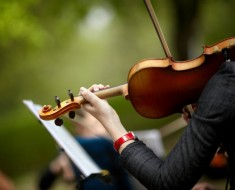Richard Wagner (1813-1883) was a visionary and lived an eventful often tumultuous life. In early years he lived in poverty in Paris. He was an innovator (he even invented his own tuba in order to give added strength to the massive orchestras he required) and a controversialist (enthusiasts of Brahms and Wagner were factions in constant conflict – indeed people have argued about him ever since). He was a philanderer. He was twice in flight from the police because of his support for revolutionaries in Dresden and Munich. He was egocentric and self- absorbed; a white supremacist who later was used by the Nazi’s for their own ugly purposes.
He was also a genius. For him ‘opera’ meant music drama on the most elevated and extravagant scale. Inspired by the German romantic spirit of Weber, and reading copiously, he wrote the text for all his works of which Der Ring des Nibelungen is the most famous and formidable, its four operas spanning fifteen hours of music. He built an opera house in Bayreuth to stage the huge drama and needed a new breed of singers who could cope with his demands.
Visiting London in 1877 he conducted a series of concerts at the Royal Albert Hall to raise money to help cover the deficit on his new building, a later development of which is still in regular use.
Wagner brought to a fine art the use of musical themes representative of the characters in the opera – the ‘leitmotiv’- and identifying those themes with their characters is a good way to prepare for the marathon of hearing the whole Ring cycle – which I have never done, though I have heard one of the four –Die Walkure, in concert performance, and three of his other operas performed on stage.
It may already have become clear that I am not a natural Wagner fan. I find him rather too po-faced and prolix – I may lack staying power, and I am not too good on heroic myths either.
Some say he was a bad influence on the development of music, as composers tried to emulate his rich orchestration but lacked his driving self-belief and discipline. But no one can deny his skill, and dedication to his art. The sheer rhythmic force and splendour of his music will never be equalled either in sheer power or in beauty. Learning from others, he created a musical world that was utterly and uniquely his own.
B.R.



